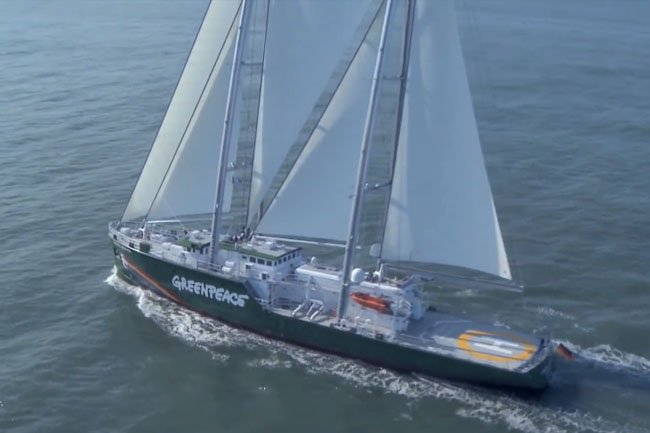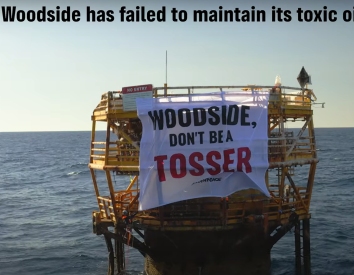Universities and other large institutions have a responsibility to drive Australia towards a carbon-free future, writes Greenpeace Australia Asia Pacific CEO David Ritter.
NO DOUBT like many teenagers, when I was sixteen I was always falling in and out of love. One relationship from those romantically turbulent times, though, has endured.
I loved the University of Western Australia (UWA) from my very first class, a lecture in late modern European history, delivered by Professor R.J.B. Bosworth. The affection persists to this day.
Earlier this week I had the honour of giving the UWA Business School’s Annual PRME Lecture, which focussed on the climate emergency and how everyone can be involved in meaningful action.
The timing was perfect because this week Greenpeace is launching a major new campaign focused in Western Australia — our first major initiative in my home state for many years.
Greenpeace is bringing our special mix of capabilities to join the collaboration being led by the Conservation Council of Western Australia (CCWA) to stop the climate-destroying Scarborough gas project from going ahead. Greenpeace’s campaign will be in full collaboration with the CCWA and others.
Woodside’s planned Scarborough gas project would be the most climate polluting development in Australia, releasing in excess of 1.6 billion tonnes of climate pollution every year. The Scarborough project would be a false road for Western Australia, totally inconsistent with a pathway towards a safer climate.
The Scarborough gas project would also threaten terrible damage to the Scott reef complex — a marvellous natural wonder, on which whales and other incredible marine wildlife depend.
Allowing this project to go ahead won’t only lock in destructive climate pollution for decades to come, risking the safety of current generations living right now.
It will also risk this incredible habitat and the Australian wildlife we all know and love. Getting involved in the campaign to stop Woodside’s planned Scarborough gas project is a great answer to the question “what can I do”.
To limit global warming at the speed and scale required for a chance at meeting the internationally agreed Paris Accord climate goals, we need systemic change. Transformation at that scale cannot be achieved through changes in individual consumption and behaviour — they require systems-level effort that is only possible through changes at an institutional level.
This doesn’t mean that we all should not do the right thing in our own lives, but systems change must be a major priority. The biggest thing that we can all do is not changing our own personal habits of consumption, but contributing to transformation on a larger scale.
If you are the CEO of a major company or a government leader, it is obvious how you contribute to systems change. When the CEO of Coles agreed to power all of their operations using 100% renewable electricity by 2025, for example, it was the equivalent of every household in Tasmania going solar.
This week even Australia’s largest electricity user, Rio Tinto, recognised the need to shift its business model, committing to a 50% reduction of emissions by 2030. One business that is notably lagging behind, AGL, is responsible for 8% of Australia’s annual domestic emissions.
It is the decisions of institutions that can drive change at scale.
However, if you are not the CEO of a major company, then it is the institutions of which we are part, and the institutions that we challenge, that really matter. You can change an institution from the inside, or from the outside. Often, it will take both forms of engagement to achieve the desired result.
During the lecture, I focused on UWA itself. I love the University of Western Australia, with which I still have an affiliation. I want this institution, to which I owe so much, to be fit for purpose in the climate crisis. The motto of UWA is "seek wisdom".
According to UWA:
'Seeking wisdom is all about exploring, in the classrooms and beyond the books. Embracing the challenges we all face, together. Wisdom is hope. Wisdom is our shared journey.'
But how can it be said to be wise to be legitimising the fossil fuel vested interests that are destroying our climate, in the midst of a climate emergency?
The wise course for any university which aspires to be future-focused and right for the times in the climate crisis is to rapidly disengage from all entanglements with fossil fuel vested interests. That means divestment and rapid transition to 100% renewable energy for all campus electricity needs.
It also means asking whether it is appropriate to have a director of Australia’s worst climate polluter, AGL, as chair of the UWA Business School Board; whether it is appropriate to give a platform to the chair of Shell Australia; whether university websites should use loaded propagandistic euphemisms like “clean coal” and “natural gas” to describe the substances that are driving the destruction of the climate.
It means no more sponsorship deals with fossil fuel corporations. It means no more research agenda to support the opening up of new fossil fuel deposits — something the International Energy Agency says should not happen if we are to have a chance of staying within the agreed Paris Accord climate goals.
Most university students are young people: furthering the commercial interests of the fossil fuel corporations through university activities is betraying their future.
David Ritter is CEO of Greenpeace Australia Pacific and adjunct professor with the University of Western Australia's Law School. You can follow David Ritter on Twitter @David_Ritter.
Related Articles
- Undeterred by pariah status, PM to wave 'green and gold' at Glasgow
- Flashback 2015: Coal comfort: The atomic emasculation of Malcolm Turnbull
- Billboard mocks Morrison as Australia prepares for COP26
- The Coalition of climate criminals
- Australia's approval of gas projects lighting climate change fires
 This work is licensed under a Creative Commons Attribution-NonCommercial-NoDerivs 3.0 Australia License
This work is licensed under a Creative Commons Attribution-NonCommercial-NoDerivs 3.0 Australia License
Support independent journalism Subscribe to IA.















